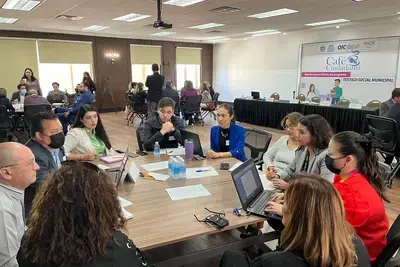
Success Story
Colombian President Signs Anti-Discrimination Law
A landmark anti-discrimination law, described by one supporter as “an homage to equality,” was signed into law last month by Colombian President Juan Manuel Santos. For the first time, it levies prison sentences for acts of discrimination on the basis of ethnicity, race, gender, sexual orientation or nationality.
The law is “a form of justice,” said President Santos. “It was time to get tough on this and to ensure the protection of the rights of those discriminated against.”
The legislation was in large part the result of tireless efforts by two local NDI partners. A key figure behind the bill’s drafting and passage was Luis Ernesto Olave, national coordinator of Afro-Colombian issues for the Independent Movement of Absolute Renovation (MIRA), the political party that introduced the bill. Olave participated in NDI’s leadership program for emerging political leaders last year.
The law will “settle an historic debt with the Afro-Colombian population, which continues to face racism,” said Senator Carlos Baena of MIRA.
The legislation originally sought to address racism alone, but to ensure passage, Representative Alfonso Prada of the Green Party expanded the bill’s scope to include discrimination against other vulnerable groups. He was the one who described it as “an homage to equality.”
In the lead-up to passage, NDI helped arrange meetings of the Afro-Colombian Round Table to identify how political parties and Afro-Colombian civic groups could work together to support the legislation. The Institute helped create the forum, made up of party and civil society leaders, to discuss how best to work with legislators on Afro-Colombian issues.
As a result of one of the meetings, more than 60 women’s, Afro-Colombian and LGBTI (lesbian, gay, bisexual, transgender, intersex) leaders coordinated a visit to the Senate on the day of the vote to advocate for its passage. These leaders included groups from the heavily Afro-Colombian department of Chocó and the post-conflict Montes de María region, where NDI focuses its work in Colombia.
Working with all eight major parties to encourage inclusion of under-served sectors of society, NDI helped several parties create secretariats for women and for ethnic affairs. These played an important role in garnering congressional support to pass the anti-discrimination bill.
“With the passage of this law, Congress takes a step forward in recognizing vulnerable populations,” said Germán Rincón Perfetti of the National Secretariat of Women for Peace (Mujeres por la Paz).
NDI provided information and tools to political parties involved with the Afro-Colombian Round Table on representation of Afro-descendant communities. The Institute’s work in Colombia focuses on helping integrate under-represented groups into the political system and on protecting their rights. Colombia’s Afro-descendants, who are concentrated in coastal areas, have long been discriminated against and face high hurdles for achieving effective political participation. Eighty percent of Afro-Colombians live in extreme poverty.
Discriminatory practices have made it particularly difficult for Afro-Colombians and women to win elective office. In response to a new requirement on parties that 30 percent of candidates be women, NDI trained hundreds of Afro-Colombian women candidates from coastal areas on skills needed to run for office.
Related:
Published Dec. 20, 2011



